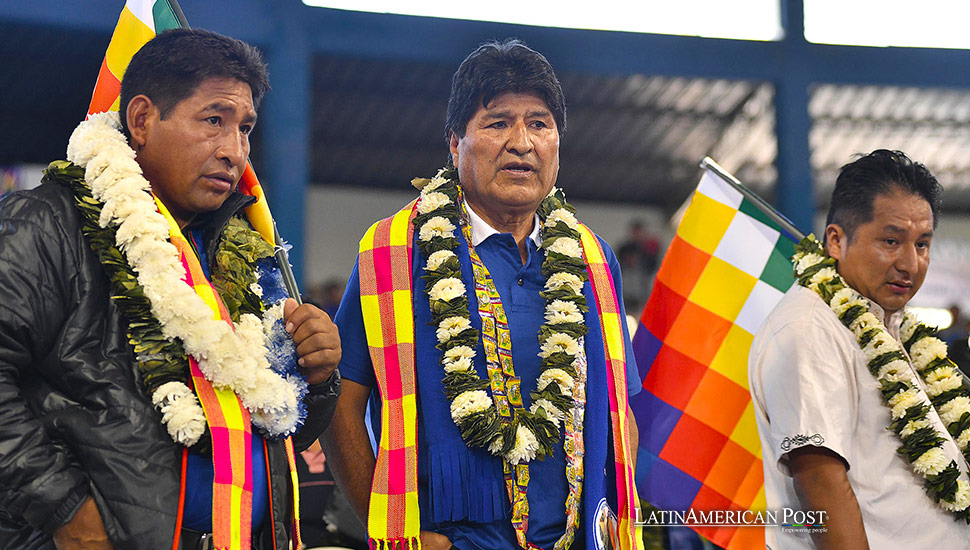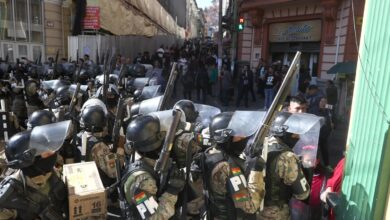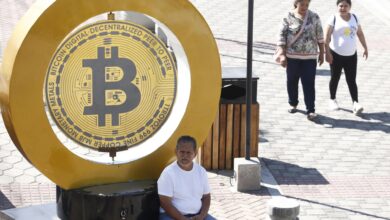Bolivia Reaffirms Limits on Presidential Terms Amid Morales’ Ambitions

In a significant move to prevent perpetual power, the Bolivian Attorney General’s Office has confirmed the prohibition of indefinite presidential reelection. This decision, as former president Evo Morales eyes the 2025 election, is sparking internal disputes within the ruling party, marking a crucial moment in Bolivia’s political landscape.
In a momentous political development, the Bolivian Attorney General’s Office has recently issued a legal document, reasserting that indefinite presidential reelection is prohibited in the country. This decision carries profound implications, aiming to prevent any individual from perpetuating their hold on power. The announcement comes at a crucial time, amidst mounting tensions within the ruling Movimiento al Socialismo (MAS) party following former President Evo Morales’s declared intention to run in the 2025 elections.
César Siles, the Bolivian Attorney General, informed the media in Sucre, Bolivia’s constitutional capital and the seat of the Judicial branch, about an “expert legal analysis” conducted by his office concerning presidential reelections. Siles explained that the document is grounded in the Inter-American Court of Human Rights (IACHR) advisory opinion from 2021 and a constitutional ruling (1010/023) issued by a Bolivian constitutional chamber in December.
“The prohibition of indefinite presidential reelection aims to prevent a person from perpetuating their power, thereby ensuring political pluralism, alternation in power, and protecting the system of checks and balances that guarantees the separation of powers,” Siles stated. He emphasized that the Attorney General’s opinion consolidates what the advisory opinion and the Constitutional Court have previously said. Constitutionally, Bolivia permits only one reelection for the president and vice president positions, rejecting the notion of indefinite reelection.
According to Siles, the IACHR advisory opinion and the 2023 constitutional ruling have “already closed the debate” on whether indefinite reelection is a human right. He further noted that the sentences and advisory opinions are binding for the Bolivian state.
The Controversy
Bolivia’s Constitution limits presidential terms to two consecutive periods. However, Evo Morales was able to run for a third term in 2014 after the Constitutional Court accepted his argument that his first term did not count because the country was reconstituted as a Plurinational State with the 2009 Constitution. This constitutional manipulation allowed Morales to circumvent the term limits, showcasing the political maneuvering within the Bolivian legal framework.
To secure his candidacy for the 2019 elections, the MAS party pushed for a 2016 referendum seeking to amend the Constitution to allow for his reelection. The referendum was unsuccessful, with voters rejecting the proposal. Despite this setback, the MAS party returned to the Constitutional Court, invoking an American Convention on Human Rights article to justify Morales’s bid for a fourth term.
In a controversial ruling in 2017, the Constitutional Court recognized leaders’ human rights to be elected and of the people to elect them, thereby allowing indefinite reelection. This decision sparked widespread debate and criticism, highlighting the tension between legal interpretations and democratic principles.
The same Constitutional Court, however, reversed its stance in December 2023 with ruling 1010/023, which aligns with the IACHR’s 2021 advisory opinion. The ruling clarifies that in Bolivia, the president and vice president can only be elected and serve for two terms, whether consecutive or not. This decision reinforces the legal framework that seeks to indefinitely prevent individuals from monopolizing political power.
Despite the legal restrictions, Evo Morales, who has been named the MAS’s ‘sole candidate’ by loyalist factions within the party, continues to assert his eligibility to run in the 2025 elections. This assertion, coupled with his repeated claims of being ‘legally and constitutionally’ permitted to seek reelection, has intensified the internal conflict within the MAS party, posing a significant challenge to Bolivia’s democratic integrity.
In January, Attorney General Siles declared that “being reelected is not a human right,” explicitly stating that Morales “has no right to run again.” This assertion has intensified the internal conflict within the MAS party, dividing those loyal to Morales and supporters of current President Luis Arce.
The pro-Morales faction has warned of potential mobilizations if Morales’s candidacy is disqualified, hinting at possible political unrest. This internal strife within the ruling party underscores the broader implications of Morales’s political ambitions and the challenges of maintaining democratic integrity in the face of such ambitions.
Historical Context and Latin American Implications
The issue of indefinite reelection and the concentration of power is not unique to Bolivia. Latin America has a long history of leaders attempting to extend their rule through various means, often resulting in political instability and undermining democratic institutions.
In neighboring Venezuela, Hugo Chávez and his successor, Nicolás Maduro, have used constitutional amendments and referendums to extend their grip on power, leading to severe economic and political crises. Similarly, in Nicaragua, Daniel Ortega has manipulated the electoral system to remain in power, facing international condemnation and domestic unrest.
Bolivia’s recent reaffirmation of term limits can be seen as part of a broader regional effort to uphold democratic norms and prevent the erosion of political pluralism. The role of international bodies, such as the IACHR and its advisory opinion, in influencing national legal frameworks, underscores their significance in promoting democratic governance in Latin America.
The Bolivian case also reflects the ongoing struggle between political forces advocating for continuity and those pushing for adherence to constitutional principles. The tension within the MAS party mirrors similar conflicts in other Latin American countries, where former leaders seek to return to power, often invoking populist rhetoric and challenging democratic safeguards.
The Bolivian Attorney General’s reaffirmation of the prohibition on indefinite presidential reelection is critical in safeguarding the country’s democratic processes. As Evo Morales and his supporters continue to push for his candidacy in 2025, Bolivia’s legal and political landscape remains fraught with tension.
The broader Latin American context underscores the arduous task of adhering to constitutional limits and preventing the concentration of power in the hands of a single individual. Bolivia’s experience serves as a stark reminder of the challenges and complexities that Latin American countries face in maintaining democratic integrity, where political ambition often clashes with democratic principles.
Also read: Dance Troupes Unite in Bolivia to Celebrate Latin American Cultures
Bolivia’s upholding of term limits and strengthening of the separation of powers sets a precedent for other Latin American countries grappling with similar issues. The coming months will be crucial in determining whether these legal principles can withstand the pressures of political ambition and whether Bolivia can navigate this period of internal strife without compromising its democratic foundations.




